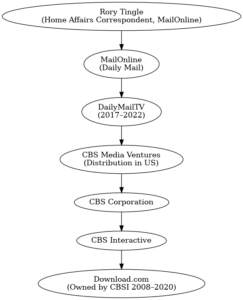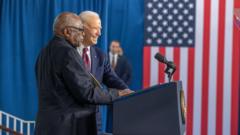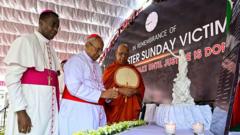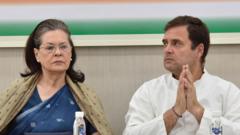Opposition parties in India are embroiled in a fierce political battle against the Election Commission over claims of widespread electoral irregularities, prompting calls for transparency and accountability amid significant public concern.
Allegations of Electoral Fraud Ignite Political Turmoil in India

Allegations of Electoral Fraud Ignite Political Turmoil in India
Tensions escalate as opposition leaders accuse the Election Commission of India of manipulating voter data favoring the BJP in the contentious 2024 elections.
A heated political controversy has erupted in India surrounding allegations of "vote theft," with opposition parties accusing the Election Commission of India (ECI) of manipulations that allegedly favored the ruling Bharatiya Janata Party (BJP) during the 2024 general elections. This unrest has led to a parliamentary session being adjourned as opposition MPs clamored for a thorough discussion regarding the sanctity of India's electoral processes.
The unrest intensified on Tuesday when numerous opposition figures, including Congress leader Rahul Gandhi, were briefly detained by police while attempting to march towards the ECI headquarters in Delhi. Gandhi initially raised these concerns during a press conference on August 7, sparking substantial backing from fellow opposition lawmakers. In response, both the Election Commission and the BJP have vehemently dismissed these claims.
Gandhi has been vocal about alleged extensive voter manipulation, presenting data he asserts highlights discrepancies in voting records, particularly in the Mahadevapura area of Bangalore Central. He contends that the voter list contained over 100,000 fraudulent entries including duplicate registrations and invalid addresses. Examples of double voting have surfaced, prompting Gandhi's assertion that such irregularities directly caused his party to lose 48 seats in the elections, as Congress secured only 99 of 543 parliamentary positions compared to the BJP's 240.
Moreover, Gandhi has called for the ECI to make digital voter rolls publicly accessible for independent audits, though the BBC has yet to verify his allegations independently. The ECI responded swiftly to Gandhi’s claims, branding them as "absurd" and challenging him to provide formal proof or retract his statements publicly.
In the broader political landscape, Gandhi's declarations have surfaced against the backdrop of an ongoing controversy regarding a massive revision of electoral rolls in Bihar, a critical state gearing up for elections this November. The Special Intensive Revision (SIR) aimed to cleanse the lists of duplicates and deceased voters, but critics argue the rushed process has disenfranchised a considerable number of eligible voters.
Echoing a national sentiment, many in Bihar reported discrepancies such as incorrect photographs and the inclusion of deceased individuals in the draft rolls, prompting legal challenges that are currently under review by India's Supreme Court. In recent statements, Gandhi intensified his criticisms, alleging a systematic level of electoral manipulation across the nation, hinting at broader issues of trust within the electoral system.
With the electoral landscape under scrutiny, this controversy illustrates significant tensions within Indian politics as the quest for election integrity remains at the forefront of public discourse.


















